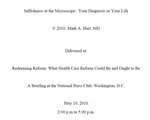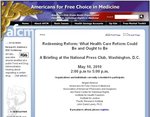Selfishness at the Microscope: Your Diagnosis or Your Life
Note: The entire program is available on the AFCM website
Selfishness at the Microscope: Your Diagnosis or Your Life
© 2010, Mark A. Hurt, MD
Delivered at:
Redeeming Reform: What Health Care Reform Could Be and Ought to Be
A Briefing at the National Press Club, Washington, D.C.
May 10, 2010
2:00 p.m to 5:00 p.m.
Thank you, Richard [Ralston], for inviting me to speak at this forum; it is an honor for me to address colleagues on such an important matter, one that affects me daily, and, as a consequence, my patients.
I am a diagnostician; I evaluate biopsies and excisions of skin by means of a microscope and my mind. My goal is to identify the nature of disease by evaluating the structure, or morphology, of each lesion.
By its nature, a diagnosis is the selfish concern of the diagnostician; he must focus on every relevant fact of the case, the clinical diagnosis, the historical precedents in the literature, his own experience, and all opposing viewpoints – all for the purpose of telling the patient, usually the clinician in my case, that the lesion is a benign neoplasm (for instance, a melanocytic nevus) or a malignant one (a melanoma), or in some cases, one doesn’t know for sure, but the facts favor one or the other diagnosis.
Why is this process selfish? It is because the diagnostician must look outward at the facts, but turn inward to his own mind, relying on his own judgment, taking the responsibility for the patient’s life. Yes, he may be able to consult others on a difficult case, but this is just an extension of fact gathering. Ultimately, he must decide in the privacy of his own soul.
Considering how important it is for a diagnostician to be able to focus and concentrate on the process of diagnosis, and considering what is at stake in every diagnosis – life or death – he must be free to think, act, and be secure in his relationship with the referring clinician and the patient so that, as much as possible, the proper diagnosis is made and the proper action is taken. Most of us who perform this kind of work love it; we love the challenge; we love being able to establish a diagnosis.
Yet, the process of diagnosis cannot be touched in any fundamental way except to destroy the conditions by which it functions optimally.
What are those optimal conditions? There are three that come to mind immediately, but perhaps there are more than these:
- A well prepared mind grounded in the liberal arts as well as the sciences
- One’s experience with the kinds of problems encountered routinely in one’s chosen field and the ability to think beyond the routine so as to advance knowledge in the field
- Political freedom, based on the principle of individual rights
The first two parameters have been the time-honored mainstay of medical practice, at least in the modern era of medicine from the 19th Century to the 1960’s. As a consequence, physicians as diagnosticians have developed a strong sense of personal pride in their work, wealth from a successful practice, and concern for the patient’s well being as well as the patient’s privacy.
It is not true that physicians made themselves wealthy by sacrificing their patients – far from it. Both benefited. It was a trade relationship in every way including when charity was extended to the indigent, especially prior to the Medicare & Medicaid era. During this period, for instance, the honest poor did not believe the care they received was theirs by right, but by trade, if nothing more than by offering a “thank you” for the care they received. They understood on some level that skills of the type offered by physicians were earned at a great price and neither could nor should be demanded of physicians without some kind of mutually agreed exchange.
This changed in the Medicare era, and it has become much worse since I entered the profession in the 1980’s. There is today no real trade relationship with patients free from intervention by the government. The government has taken on the role of the “grantor” of “charity”, but there is no trade in this because the government has extorted physicians’ labor, regulated their practices, and compromised their thinking by paying for their services with stolen money redistributed to them via the Social Security Administration.
This brings me to point three: Political Freedom in the medical professions.
Let me be frank; we are not living under political freedom in the practice of medicine, which will not shock most of you. Here are some examples:
- Our prices are fixed by Medicare, and Medicare drives the pricing in what remains of the insurance industry, the latter being blamed for all the economic ills they did not cause in any fundamental way.
- Our industry is regulated beyond belief. The FDA, licensing laws (both federal and state), and arbitrary recertification laws are just a few of them.
- In pathology laboratories, endless checklists must be maintained with the specter of arbitrary inspection and the threat of license revocation, even when laboratories are reputable and have never been sued for violating anyone’s rights.
- Private research is more difficult to do because so much money is funneled by the government into publically funded research, often with laughable consequences, if they were not so serious.
What may shock you, however, is that there is resistance to political freedom in the medical profession by the physicians themselves, with notable exceptions. In my sphere in St. Louis, I have observed very little actual opposition to huge bureaucracies, such as the FDA, Medicare, Medicaid, the National Institutes of Health, the “bricks and mortar VA”, or the CDC. Most physicians want them. I do not; I believe they exist because of the immoral principle of altruism. Even if one did not consider the individual rights infringements involved with these institutions, at their very best they are too expensive, too bureaucratic, and they don’t deliver what they claim to deliver.
The title of this talk is “Selfishness at the Microscope: Your Diagnosis or Your Life.” We are approaching a point in the discipline of medicine where it is becoming more difficult to practice the art of diagnosis. When private practice ceases to exist, there will be checklists of prescribed criteria that must be met by government edict to “establish” an “official” or government sanctioned diagnosis so that it will be covered by the governmental system. Even if a few of us private practitioners remain to weather this storm on our rights, our numbers will be diminished because of the difficulty coping psychologically with being told what we must do, rather than by controlling the terms of our own practices and doing what we should do for ourselves and our patients. If this happens, diagnosticians like me will be out of the system because personal profit in medicine will no longer be allowed.
Let there be no mistake about the meaning of profit; it is the payment on the risk taken for creating the values necessary to sustain life and make it worth living; profit is morally good and necessary. If profit becomes illegal, your life will be at serious risk because all diagnoses will be political rather than based on facts evaluated by a free and independent mind.
Don’t let that happen. Oppose government regulated and controlled medicine in any legal way you can, and reverse it to a completely private system when the next opportunity is open. As long as men are semi-free, the opportunity will be open.
Jefferson, his 1st Inaugural Address, in this city, March 4, 1801, stated that:
... fellow-citizens—a wise and frugal Government, which shall restrain men from injuring one another, shall leave them otherwise free to regulate their own pursuits of industry and improvement, and shall not take from the mouth of labor the bread it has earned. This is the sum of good government, and this is necessary to close the circle of our felicities.
Ayn Rand, the philosopher, in her 1963 article on “Man’s Rights” (1) stated also that:
There is no such thing as “a right to a job” — there is only the right of free trade, that is: a man’s right to take a job if another man chooses to hire him. There is no “right to a home,” only the right of free trade: the right to build a home or to buy it. There are no “rights to a ‘fair’ wage or a ‘fair’ price” if no one chooses to pay it, to hire a man or to buy his product. There are no “rights of consumers” to milk, shoes, movies or champagne if no producers choose to manufacture such items (there is only the right to manufacture them oneself). There are no “rights” of special groups, there are no “rights of farmers, of workers, of businessmen, of employees, of employers, of the old, of the young, of the unborn.” There are only the Rights of Man — rights possessed by every individual man and by all men as individuals.
In closing, and in this same vein, there is no right to health care except by producing it or trading for it, else it will cease to exist – and so will your diagnosis. Without your rights secured, your diagnosis will matter no longer – because it will not be a diagnosis.
If your diagnosis is at stake, then your life is at stake as well as the lives of every individual you love. If you care about your diagnosis, then don’t allow the Rights of Man to be infringed further without a fight.
If you wish to live as a human being, then help return the practice of medicine to the private practice of medicine.
Reference:
Rand A. Man’s Rights. The Objectivist Newsletter 1963; 2(4):13
Read the speech in PDF format.

